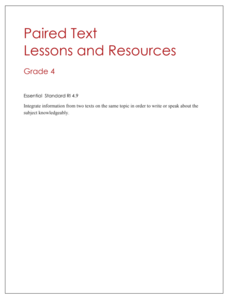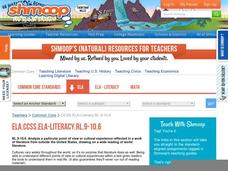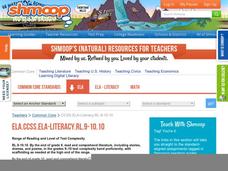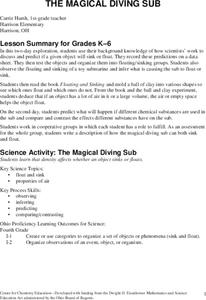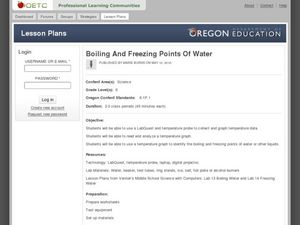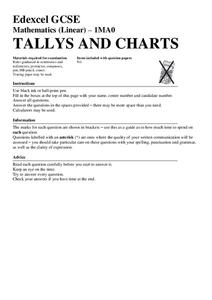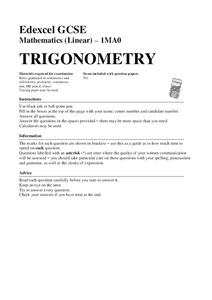Curated OER
A Colony is Born : Lesson 5 - Dear Mem
Discover colonies! Young historians will listen to a primary source journal entry read aloud with a backdrop of wave sounds. They discuss the entry, add historical facts to a chart and personal insights to another. Then they listen to...
Curated OER
Introduction to Archetypes
Here is a full lesson with all the needed materials and PowerPoints attached! Introduce your class to archetypes by showing them the included presentation. The presentation gives definitions and examples of archetypal characters,...
Scholastic
Study Jams! Soil
Seven superb slides sharpen science students' scoop on soil. In viewing them and reading the accompanying captions, your class will uncover the importance, different types, horizons, and protection of soil. They can then assess their new...
Scholastic
Study Jams! Fossils
By viewing and reading these slides, your precious paleontologists learn what makes a fossil and what scientists can learn by studying them. Consider giving the website to pupils as homework. They can read the slides, take an assessment...
Curated OER
Medical Explorer
After reading a case study, pupils will explore possible diagnoses, assessment, and treatment plans. Finding the definitions to medical vocabulary and sorting through patient history, they will begin to understand the process of...
Washington Township Public Schools
Using Paired Text
Paired reading passages frequently appear on standardized exams, but finding text sets to use in the classroom is sometimes a challenge. A lesson plan on using paired texts includes a selection of passages and a graphic organizer for...
Shmoop
ELA.CCSS.ELA-Literacy.RL.9-10.6
Being able to identify and understand the point of view of fictional characters across a wide range of time periods, places, and cultures is a skill that is necessary for becoming a proficient reader. It is also a skill identified in the...
Shmoop
ELA.CCSS.ELA-Literacy.RL.9-10.10
How do you assess what your pupils have learned over the course of the year? Find out how competent they are at reading and analyzing age-level literature with the ideas presented here. Included in this resource are two suggested...
Curated OER
The Magical Diving Sub
First graders discuss and predict if a given object sinks or floats. They record their predictions on a data sheet. Pupils test the objects and organize them into floating/sinking groups. Students observe the floating and sinking of a...
Curated OER
Boiling and Freezing Points of Water
Challenge your sixth graders with this lesson about the freezing and boiling points of water. In these activities learners graph temperature data, read and analyze information, and identify the freezing and boiling points of water and...
Smarter Balanced
Zoos
How do the experiences of animals living in zoos differ from animals living in the wild? To prepare for a performance assessment on this question, class members are introduced to key concepts and vocabulary, and then groups use a Venn...
Mathed Up!
Fractions of an Amount
After viewing a video on fractional amounts, young mathematicians put their new knowledge to the test. Throughout the assessment, class members find the fractional amount for prices, times, and populations. There are a few percent and...
Scholastic
Study Jams! Solid Figures
Figure out the correct name for different three-dimensional shapes by watching the presentation on solid figures. Go through the main figures and read about the characteristics of each. Finish the topic with a multiple choice online...
Curated OER
Counting Mat
Using the provided counting mats (1-6 and 7-12) and small objects to count with, guide your young learners to match the correct number of objects to the written numeral and dots. Class members will either read the numeral and count out...
Mathed Up!
Tallys and Charts
After watching a brief instructional video, young mathematicians are put to the test. By completing and reading frequency tables, tally charts, and bar graphs, individuals show their understanding of how to interpret data.
Teach Engineering
Exploring Bone Mineral Density
Bone up on bone density. The second installment of the seven-part series has pupils read articles on two different websites to learn about bone density and its measurement, as well as X-rays and other imaging tools. A quiz assesses their...
Curated OER
Trash Talkin
Young scholars investigate recycling at several scales, including local, state, national and global. They become aware of recycling, re-use, reduce efforts and policies. Students read the article Where Does Your Garbage Go. They look up...
Shmoop
ELA.CCSS.ELA-Literacy.SL.11-12.3
Dr. Martin Luther King Jr.'s speech, "I Have a Dream," is one of the most famous in United States history, but why was it so effective? Ask your class to determine the answer to this question. While the resource includes a description of...
Curated OER
Ecological Cycles Part 1
Knowing about the hydrologic cycle is the first step to understanding the carbon cycle. Upper graders discuss the earth's water content, polar ice caps, and the concept of the ecological cycle as it applies to carbon, nitrogen, and other...
cordovla.weebly.com
Summarizing, Paraphrasing and Quoting
How skilled are your class members at summarizing, paraphrasing, and quoting from a text? Find out with this assessment that asks readers to identify the thesis statement, the summary, the paraphrases, and the quoted material in an...
National Geographic
Plant Life
Looking for a guide to pair with non-fiction concept books? Intended to go with science-based leveled text mentioned in the resource, a unit allows for the study of plant life while enhancing academic vocabulary, language skills, and...
Mathed Up!
Fractional and Negative Indices
Explore how to deal with fractional and negative exponents. Scholars watch a video reviewing fractional, zero, and negative exponents. After the video, they test their skills by completing a learning exercise covering the concepts.
Mathed Up!
Trigonometry
Learn how to solve a triangle. Young mathematicians view a video that explains how to apply trigonometry to find missing sides and angles of a right triangle. A worksheet tests their understanding of the concept.
Royal Society of Chemistry
Green Plastics—Chemistry Outreach
How do green plastics reduce waste and environmental pollution? Budding scientists create and test a variety of compounds used in green plastics during an insightful experiment. Beginning with startling statistics and ending with...






